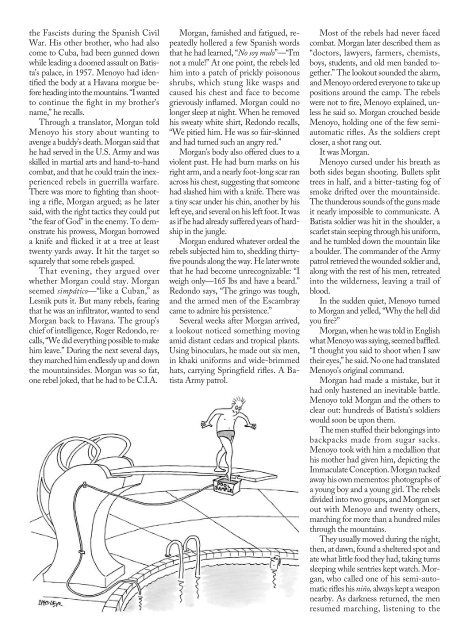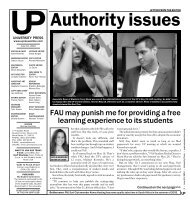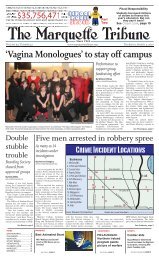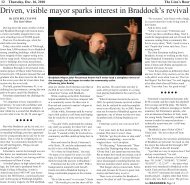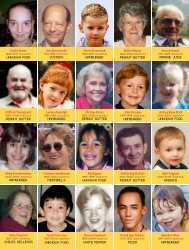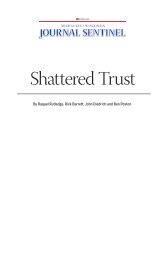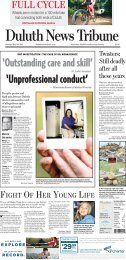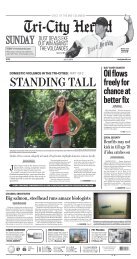THE YANKEE COMANDANTE
THE YANKEE COMANDANTE
THE YANKEE COMANDANTE
Create successful ePaper yourself
Turn your PDF publications into a flip-book with our unique Google optimized e-Paper software.
the Fascists during the Spanish Civil<br />
War. His other brother, who had also<br />
come to Cuba, had been gunned down<br />
while leading a doomed assault on Batista’s<br />
palace, in 1957. Menoyo had identified<br />
the body at a Havana morgue before<br />
heading into the mountains. “I wanted<br />
to continue the fight in my brother’s<br />
name,” he recalls.<br />
Through a translator, Morgan told<br />
Menoyo his story about wanting to<br />
avenge a buddy’s death. Morgan said that<br />
he had served in the U.S. Army and was<br />
skilled in martial arts and hand-to-hand<br />
combat, and that he could train the inexperienced<br />
rebels in guerrilla warfare.<br />
There was more to fighting than shooting<br />
a rifle, Morgan argued; as he later<br />
said, with the right tactics they could put<br />
“the fear of God” in the enemy. To demonstrate<br />
his prowess, Morgan borrowed<br />
a knife and flicked it at a tree at least<br />
twenty yards away. It hit the target so<br />
squarely that some rebels gasped.<br />
That evening, they argued over<br />
whether Morgan could stay. Morgan<br />
seemed simpático—“like a Cuban,” as<br />
Lesnik puts it. But many rebels, fearing<br />
that he was an infiltrator, wanted to send<br />
Morgan back to Havana. The group’s<br />
chief of intelligence, Roger Redondo, recalls,<br />
“We did everything possible to make<br />
him leave.” During the next several days,<br />
they marched him endlessly up and down<br />
the mountainsides. Morgan was so fat,<br />
one rebel joked, that he had to be C.I.A.<br />
Morgan, famished and fatigued, repeatedly<br />
hollered a few Spanish words<br />
that he had learned, “No soy mulo”—“I’m<br />
not a mule!” At one point, the rebels led<br />
him into a patch of prickly poisonous<br />
shrubs, which stung like wasps and<br />
caused his chest and face to become<br />
grievously inflamed. Morgan could no<br />
longer sleep at night. When he removed<br />
his sweaty white shirt, Redondo recalls,<br />
“We pitied him. He was so fair-skinned<br />
and had turned such an angry red.”<br />
Morgan’s body also offered clues to a<br />
violent past. He had burn marks on his<br />
right arm, and a nearly foot-long scar ran<br />
across his chest, suggesting that someone<br />
had slashed him with a knife. There was<br />
a tiny scar under his chin, another by his<br />
left eye, and several on his left foot. It was<br />
as if he had already suffered years of hardship<br />
in the jungle.<br />
Morgan endured whatever ordeal the<br />
rebels subjected him to, shedding thirtyfive<br />
pounds along the way. He later wrote<br />
that he had become unrecognizable: “I<br />
weigh only—165 lbs and have a beard.”<br />
Redondo says, “The gringo was tough,<br />
and the armed men of the Escambray<br />
came to admire his persistence.”<br />
Several weeks after Morgan arrived,<br />
a lookout noticed something moving<br />
amid distant cedars and tropical plants.<br />
Using binoculars, he made out six men,<br />
in khaki uniforms and wide-brimmed<br />
hats, carrying Springfield rifles. A Batista<br />
Army patrol.<br />
Most of the rebels had never faced<br />
combat. Morgan later described them as<br />
“doctors, lawyers, farmers, chemists,<br />
boys, students, and old men banded together.”<br />
The lookout sounded the alarm,<br />
and Menoyo ordered everyone to take up<br />
positions around the camp. The rebels<br />
were not to fire, Menoyo explained, unless<br />
he said so. Morgan crouched beside<br />
Menoyo, holding one of the few semiautomatic<br />
rifles. As the soldiers crept<br />
closer, a shot rang out.<br />
It was Morgan.<br />
Menoyo cursed under his breath as<br />
both sides began shooting. Bullets split<br />
trees in half, and a bitter-tasting fog of<br />
smoke drifted over the mountainside.<br />
The thunderous sounds of the guns made<br />
it nearly impossible to communicate. A<br />
Batista soldier was hit in the shoulder, a<br />
scarlet stain seeping through his uniform,<br />
and he tumbled down the mountain like<br />
a boulder. The commander of the Army<br />
patrol retrieved the wounded soldier and,<br />
along with the rest of his men, retreated<br />
into the wilderness, leaving a trail of<br />
blood.<br />
In the sudden quiet, Menoyo turned<br />
to Morgan and yelled, “Why the hell did<br />
you fire?”<br />
Morgan, when he was told in English<br />
what Menoyo was saying, seemed baffled.<br />
“I thought you said to shoot when I saw<br />
their eyes,” he said. No one had translated<br />
Menoyo’s original command.<br />
Morgan had made a mistake, but it<br />
had only hastened an inevitable battle.<br />
Menoyo told Morgan and the others to<br />
clear out: hundreds of Batista’s soldiers<br />
would soon be upon them.<br />
The men stuffed their belongings into<br />
backpacks made from sugar sacks.<br />
Menoyo took with him a medallion that<br />
his mother had given him, depicting the<br />
Immaculate Conception. Morgan tucked<br />
away his own mementos: photographs of<br />
a young boy and a young girl. The rebels<br />
divided into two groups, and Morgan set<br />
out with Menoyo and twenty others,<br />
marching for more than a hundred miles<br />
through the mountains.<br />
They usually moved during the night,<br />
then, at dawn, found a sheltered spot and<br />
ate what little food they had, taking turns<br />
sleeping while sentries kept watch. Morgan,<br />
who called one of his semi-automatic<br />
rifles his niño, always kept a weapon<br />
nearby. As darkness returned, the men<br />
resumed marching, listening to the


